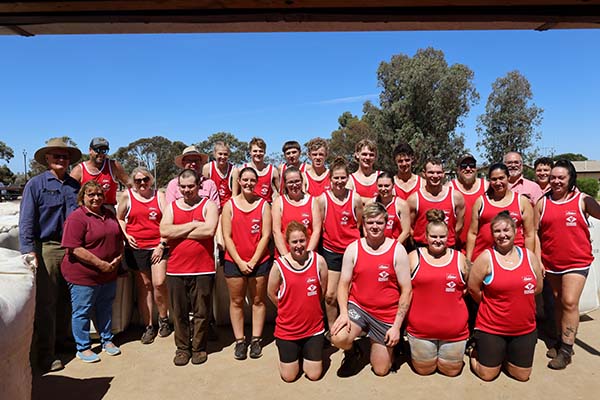West of Port Augusta in the South Australian outback, you’ll find Pandurra Station, one of the oldest pastoral leases in the state.
 Bruce and Julie Nutt alongside their team of trainee shearers.
Bruce and Julie Nutt alongside their team of trainee shearers.
Pandurra was first purchased by the Nutt family in 1895, and six generations on, the station is now comprised of over 80,000 hectares of natural grazing land, running approximately 20,000 sheep.
Producing Merino wool remains one of the primary activities for the station, with the main shearing taking place in March each year.
Pandurra do their shearing a little differently, with this year marking the 50th year that the Nutt family has hosted a shearing school in partnership with the Shearing Contractors’ Association of Australia (SCAA).
Bruce Nutt, owner and operator of Pandurra, explained that it is all about providing an opportunity for up-and-coming shearers to learn their trade and join the industry.
“This year we have eight trainee shearers on our team,” he said, explaining that they have been supplemented with five professional shearers, only due to a shortage of trainees.
“In this shed, the team will get through around 17,000 sheep, and in another shed, there will be a further 3,000.
“The quality is good, as always, and they are here to learn, so the attitudes tend to be good too.
“Over time, the school has really evolved into an improver school, so they are finishing their training here, and then are nearly ready for a full contract job.”
Damien Webb, Elders Livestock Manager for northern South Australia, explained that shearer and shed hand shortages are one of the biggest issues facing the sheep industry, making the Nutt family’s contribution even more important.
“The shearing industry is at a critical point at the moment, with plenty of properties struggling to find shearers,” Damien said.
“For a family to be involved in shearer training for now 50 years shows they are really industry focussed.
“What the family have done for the shearing industry over so many years is a credit to them.”
Bruce explained that the Nutt family has a proud history of dealing with Elders.
“I’m pretty certain that our family were dealing with Elders prior to even taking on Pandurra,” he said.
“My great, great grandfather would have first dealt with Elders when he had the pub at Yatina, because he set up the saleyard there. My great-grandfather also dealt with Elders regularly, so it’s been a long, long time.
“In 130 years, there would be fewer than ten Pandurra bales which have been sold outside of our dealings with Elders.”
Bruce concluded by saying that sustainability a critical practice for the family and the business.
“It is important that we set the business up for our next generation,” he said.
Pandurra Station
Learn more about Pandurra and the family behind the station.